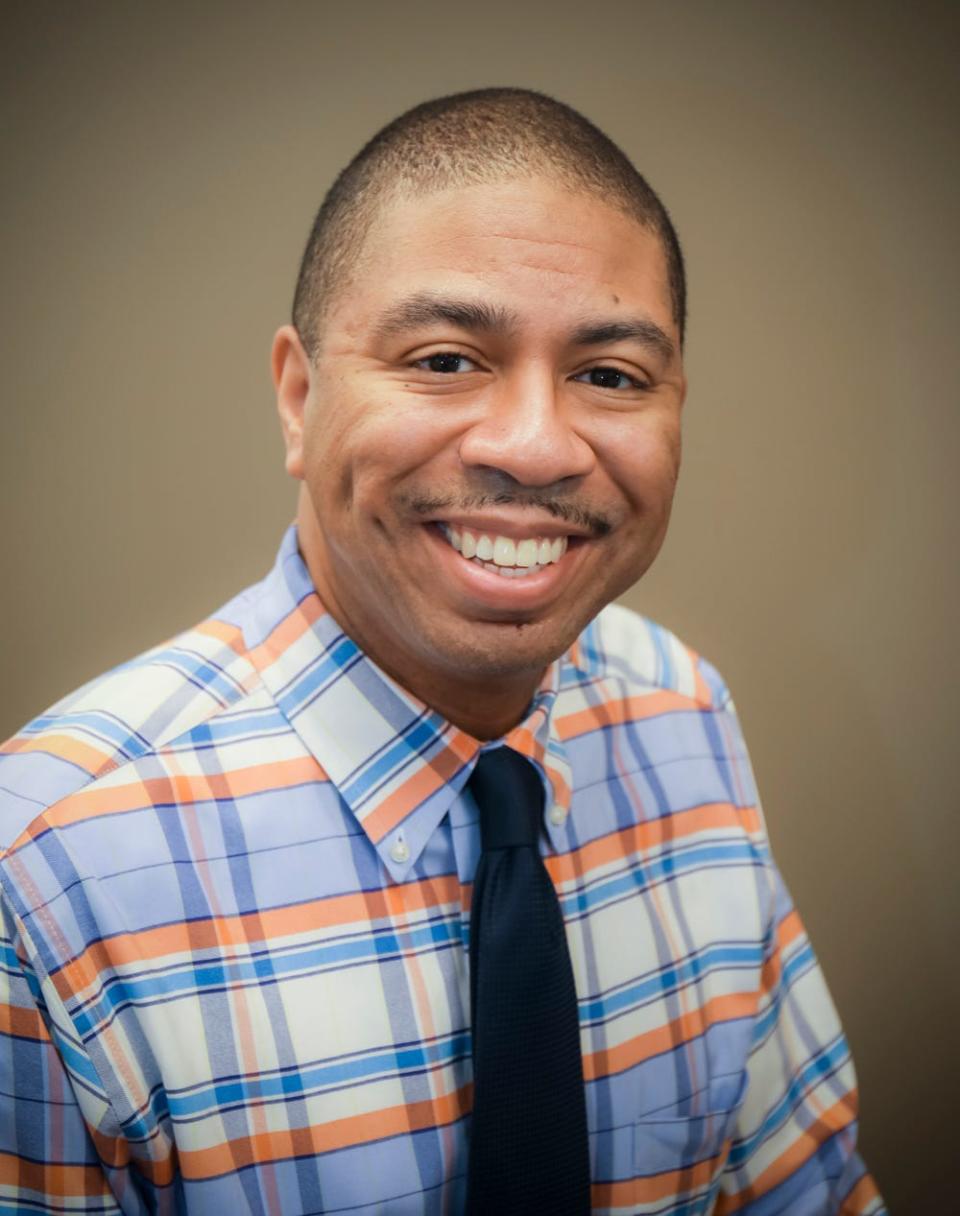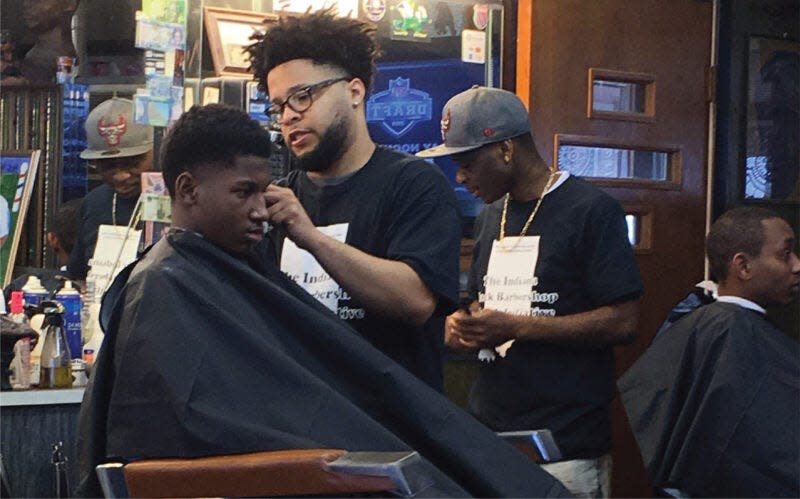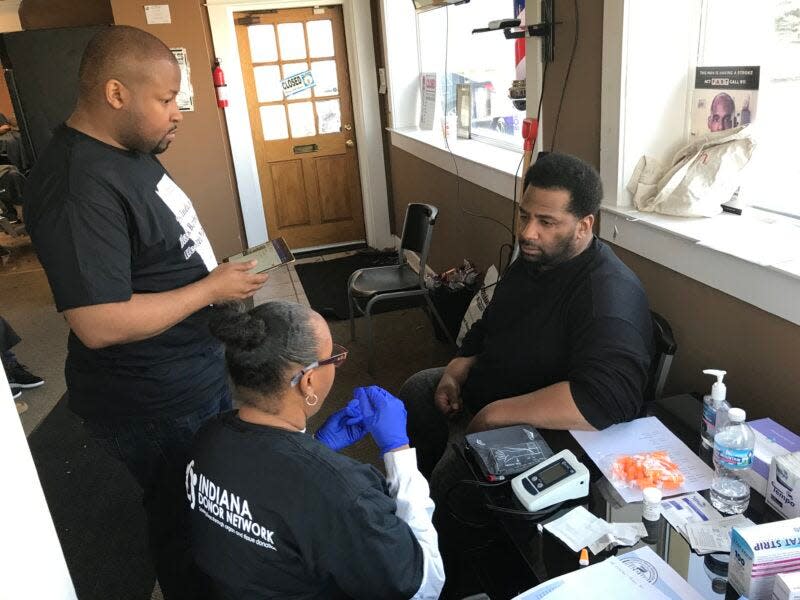100 Black Men of Greater South Bend hosts community health outreach events
SOUTH BEND — It's not every day you can get a routine checkup and a haircut at the same place, but on Saturday, April 29, four local barbershops will become one-stop shops for a haircut, blood pressure reading, blood glucose test and BMI check.
The one-day event comes out of a partnership between the 100 Black Men of Greater South Bend and the statewide Indiana Black Barbershop Health Initiative. From 8 a.m. until noon Saturday, any member of the community can receive free blood pressure, blood glucose and BMI tests at these South Bend barbershops: Al’s House of Style, located at 618 N. Olive St.; Cutrageous, located at 2921 W. Sample St.; RG’s Barber Shop, located at 2210 Miami St. and Wigfall Barber Shop, located at 1131 W. Washington St.
The Indiana Black Barbershop Health Initiative, or IBBHI, event is one of two upcoming community health outreach events that 100 Black Men of Greater South Bend health and wellness co-chair Michael Harley helped organize and said will positively impact the local Black community in the areas of health and wellness.

The other event, facilitated by a nutritionist, is "Dining with Diabetes," a four-part educational workshop on strategies for cooking, eating and exercising with Type 2 Diabetes.
Although this marks only the second year that 100 Black Men has partnered with IBBHI, IBBHI has hosted community health outreach events in barbershops across Indiana for more than a decade.
Last year, Harley said, 68 people were able to receive checkups at South Bend's IBBHI event, which took place at Al's House of Style, RG's and Wigfall. This year, Harley is confident more people will be able to be checked. This is because COVID-19 restrictions have loosened, and barbershops are no longer appointment-only, so walk-in customers will be able to get checked while waiting for a haircut. Nursing students from Indiana University South Bend will administer the health tests.
Barbershops provide a comfortable, familiar place to receive health checks for men who typically wouldn't want to see a doctor. Harley said men in general are less comfortable talking about health and going to the doctor than women, but this can be especially true for Black men.
"It's a little bit worse for Black men sometimes because of history," he said. "Oftentimes, depending on where someone grew up, their grandparents … may not have had a Black physician in their community."
That means, just two generations ago, many Black people couldn't have seen a doctor even if they wanted to. Because of this, Harley continued, many Black people have learned and relied on home remedies rather than seeking professional medical attention.

The 100 Black Men health and wellness commission knows "it's important to know our (health) numbers … and we know that most Black men are going to go to the barbershop," Harley said. "That's one place that we do go, even if we aren't going to the doctor."
For men who may be skeptical of going to the doctor, having supportive nursing students and their barber ― who they trust and has been cutting their hair for a long time ― telling them there's nothing wrong with seeing a doctor can help them see it as part of a normal, healthy routine, Harley said.
This encouragement can also help men feel more comfortable seeing a doctor if they discover they have a health issue. One health issue Harley hopes the IBBHI event will raise awareness of is high blood pressure.
"Because of the way blood pressure works, oftentimes people don't have symptoms, and so people say they feel fine, but they have high blood pressure," he said. "That's why we really want to make sure we check blood pressure because it's something that people don't often know they have, so sometimes people call it the 'silent killer.'"
In addition to the administration of health tests, IBBHI event attendees will be presented with resources, including information on how to get high blood pressure under control and a list of local physicians who accept uninsured or underinsured patients. Furthermore, anyone who gets checked will be entered into a raffle to win a free haircut.
"Just pop in, and get it done," Harley said. "Get checked, get your haircut, and go about your day. You'll know more about your health, and you can have a little bit more peace knowing that, 'Hey, I know more than I did know. Now I can do something about it.'"

Dining with Diabetes
Like high blood pressure, Harley said, he noticed that diabetes disproportionately affects the Black community.
According to the Centers for Disease Control and Prevention, 12.1% of Black adults in the United States have diabetes compared to 7.4% of white adults and 11.3% of the country's total adult population.
Hoping to put on an event that would benefit individuals with diabetes and their families, the 100 Black Men partnered with Purdue Extension-St. Joseph County to hold "Dining with Diabetes," four workshop sessions geared toward improving healthy eating, cooking and exercise habits among diabetics.
Purdue Extension nutritionist Asa Reid, who will facilitate the workshops, described "Dining with Diabetes" as "a cooking school that offers a practical approach to eating for those with Type 2 diabetes. It includes meal planning, meals and snacks, and help with healthy recipes."
Though workshop participants will make only one recipe each session, over the course of the first three sessions, they will receive at least 30 recipes, including coconut macaroon cookies, white chocolate orange pudding, spicy grilled chicken, Tuscan tuna and white bean salad, Reid said. Participants will also learn about physical activity, nutritional components such as carbs, sweeteners and sodium, and the Idaho Plate Method, a food group-based meal planning strategy.

Reid said the workshops give attendees "the opportunity to connect with others in the community who are also living with diabetes."
"It is important to have a support group of like-minded individuals and find other individuals with diabetes," he said. "We don't talk about our health very much; it's not something that, in casual conversation, 'Oh, I have diabetes.' So, you go to this class … and everybody there is living with diabetes. You didn't have to tell anybody. You didn't have to make yourself vulnerable like that."
In working with the 100 Black Men, Reid also tailored the workshops to the Black community by focusing on soul food and other recipes common in many Black homes.
"We're going to talk about how we can find alternative substitutes for some of the things in the recipes they make," Reid said. "Mac-and-cheese is a big staple in Black families and African American communities. A simple substitution is wholegrain noodles instead of the bleached ones, and your cost is just about the same. And, honestly, with noodles smothered in cheese ― which are delicious ― I can't notice a difference in the noodles' taste or texture."
The first three "Dining with Diabetes" workshops take place Tuesdays May 2, 9 and 16 at 5:30 p.m. at the Nexus Center located at 3607 S. Main St. A fourth follow-up session will be held in August where participants will be able to show the positive changes they've made and can address and work on those they've not yet implemented.
The cost of attendance for the entire series of workshops is $40 for an individual and $65 for a couple. However, the 100 Black Men will reimburse anyone who attends all three May sessions.
For more information on the workshops, call the office of Asa Reid at 574-235-9605. extension 7098. Participants must register at https://cvent.me/WnbyeG
Email staff writer Claire Reid at cereid@gannett.com.
This article originally appeared on South Bend Tribune: 100 Black Men of Greater South Bend offers checkups, diabetes class

